Key takeaways:
- Reparations are more than financial compensation; they involve healing communities and acknowledging historical wrongs.
- The debate over reparations has historical roots, beginning in the aftermath of the Civil War with unfulfilled promises to formerly enslaved people.
- Key events like the Tulsa Race Massacre and the Civil Rights Movement pivotalized the reparations discussion in the U.S.
- Perspectives on reparations include economic justice, moral accountability, and the practical challenges of implementation, highlighting the complexity of the issue.

Understanding reparations politics
Reparations politics is deeply rooted in historical grievance, often challenging us to confront uncomfortable truths about our past. I remember the first time I learned about the long-lasting impacts of slavery and colonialism; it was an eye-opening moment that reshaped how I view social justice. When we discuss reparations, it’s crucial to recognize that we’re not merely addressing financial restitution but also the healing of communities and the acknowledgment of wrongs.
As I delved deeper into this topic, I began to wonder: what does true justice look like for those affected by systemic injustices? For me, it became clear that reparations are much more than monetary compensation; they symbolize a commitment to rectify historical wrongs and foster genuine reconciliation. There are stories of communities transformed by reparative measures, where acknowledgment paved the way for healing and progress.
Understanding reparations politics requires an examination of power dynamics and systemic inequities that have persisted across generations. Engaging in these discussions has often sparked debates; I’ve found that sharing personal experiences or stories of individuals affected by injustices makes the topic more relatable and human. What if we all took a moment to listen to these narratives? They might just reshape our perspectives on justice and responsibility.
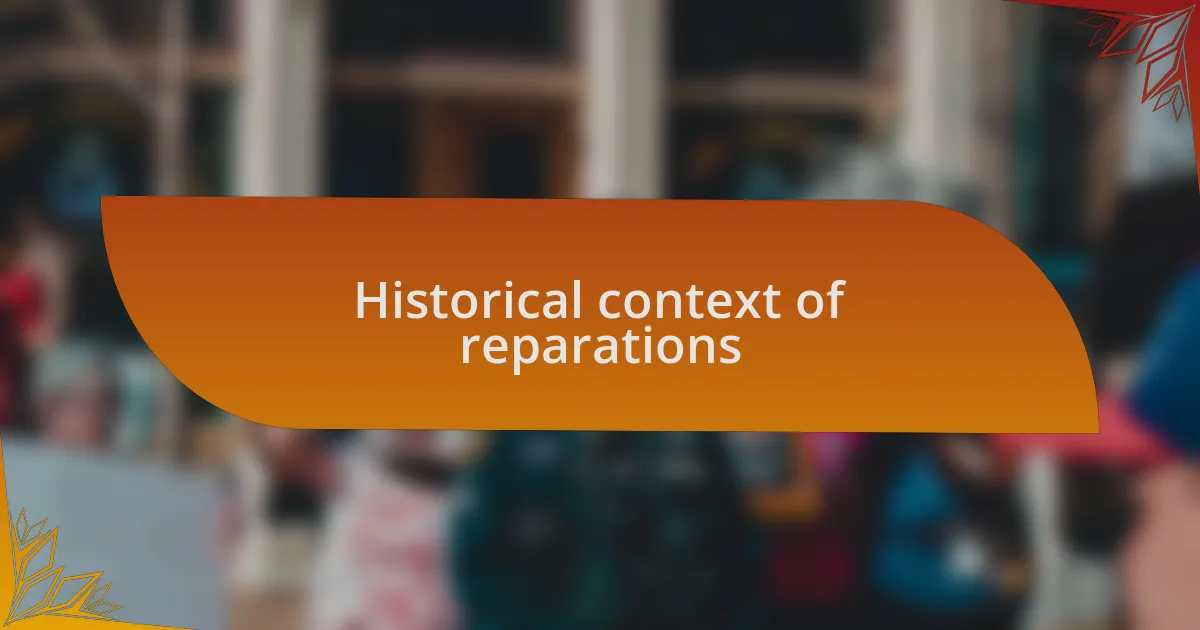
Historical context of reparations
Reparations have a complex history tied to the recognition of past injustices, particularly regarding African slavery and Indigenous displacement. I recall reading accounts of how, even after emancipation, many Black Americans were left in a cycle of poverty due to systemic barriers. Those stories hit home for me, illustrating how the absence of reparative efforts can perpetuate inequality for generations.
The debate over reparations isn’t new; it dates back to the aftermath of the Civil War, when promises made to formerly enslaved people were systematically ignored. I’ve often wondered how different our current landscape would look if those promises had been kept. This question lingers in my mind, pointing to the profound implications of acknowledging historical debts.
Moreover, reparations also extend beyond financial compensation. Initiatives in other countries, such as Germany’s reparations to Holocaust survivors, prompted me to think about what true atonement looks like. Can we find a balance between financial restitution and meaningful societal reforms? This exploration not only reshapes my understanding of reparations but also compels me to consider how we can all contribute to a more equitable future.
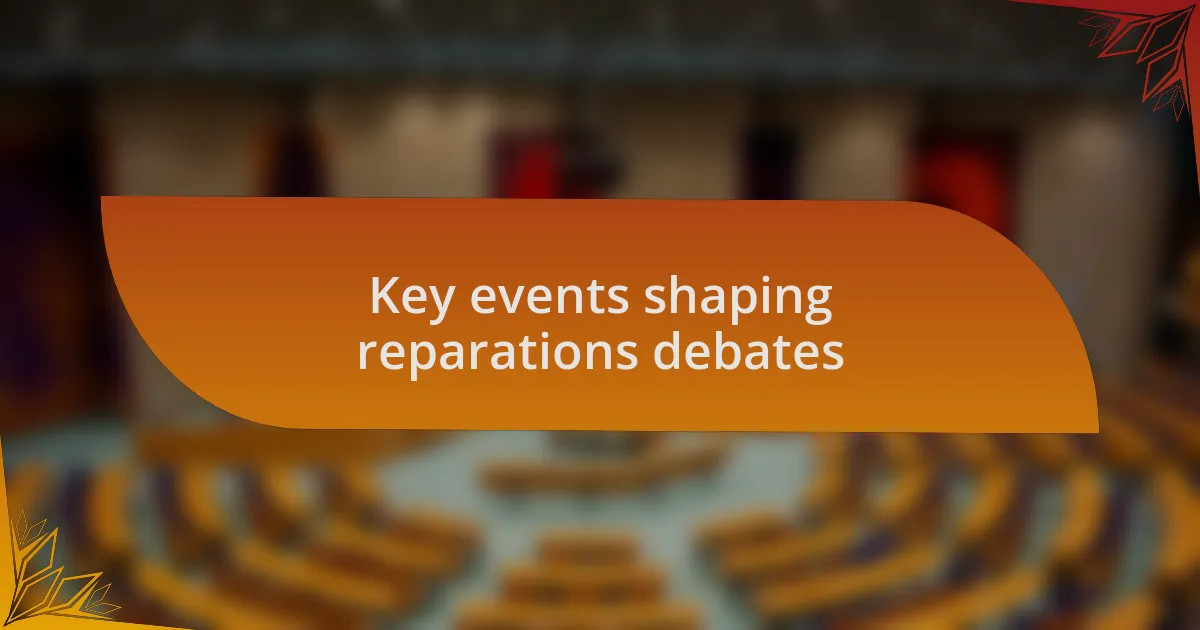
Key events shaping reparations debates
The 1921 Tulsa Race Massacre stands out as a pivotal event that intensified reparations discussions in the United States. After this horrific attack on Black Wall Street, I was struck by how much was lost—not just lives, but an entire thriving community. The injustice of this event, where survivors and descendants have yet to see reparative justice, prompts me to ask: What does it mean for society to ignore such a deep wound?
In the 1980s, calls for reparations gained momentum, particularly with the civil rights movement’s revival. Hearing about activists who fought for Black reparations during this time resonates with me. It reminds me that the struggle for equity has always been intertwined with a quest for historical acknowledgment. I wonder, how many voices are still waiting to be heard in the reparations conversation, and what stories remain untold?
The establishment of the U.S. Commission on Civil Rights in the 1960s marked another significant moment in this debate. I find it fascinating how this commission shed light on systemic racism and reparations, laying groundwork for future discussions. It’s a testament to how understanding our past can inform actions that lead to meaningful change. How can we build on this historical foundation to forge a fairer future for all?
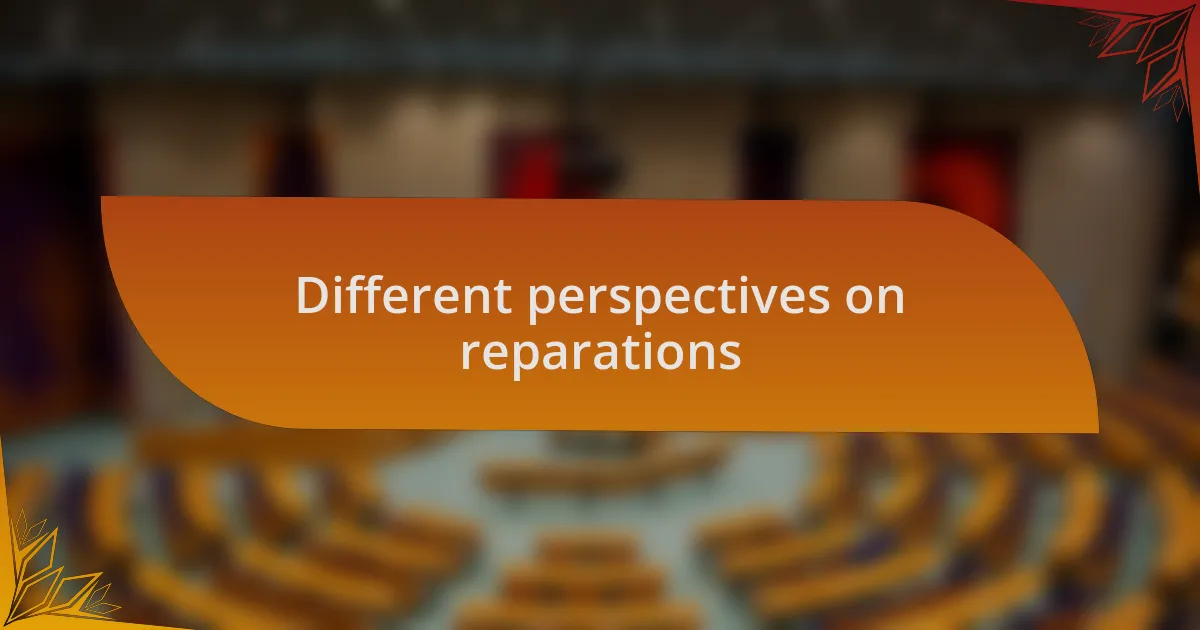
Different perspectives on reparations
One perspective on reparations is rooted in economic justice. I recall a conversation with a friend who emphasized how reparations could serve as a vehicle for closing the wealth gap. This isn’t just about financial compensation; it’s about acknowledging systemic inequalities that have persisted for generations. How might society shift if those who have been historically marginalized received the support they need to thrive?
Another viewpoint focuses on moral accountability. I recently attended a discussion where a speaker passionately argued that reparations are a matter of ethical responsibility. It struck me how deeply intertwined the concepts of justice and acknowledgment are. When we reflect on the legacy of slavery and segregation, isn’t it our duty to confront these painful truths rather than sidestep them?
Lastly, some critics question the practicality of implementing reparations. This perspective makes me think about the complexity of legislating emotional healing. During a community forum, an attendee posed a thought-provoking query: “What does it mean to measure justice in tangible terms?” It’s fascinating to explore how different definitions of justice can lead to divergent opinions on reparations, highlighting the need for nuanced discussion.
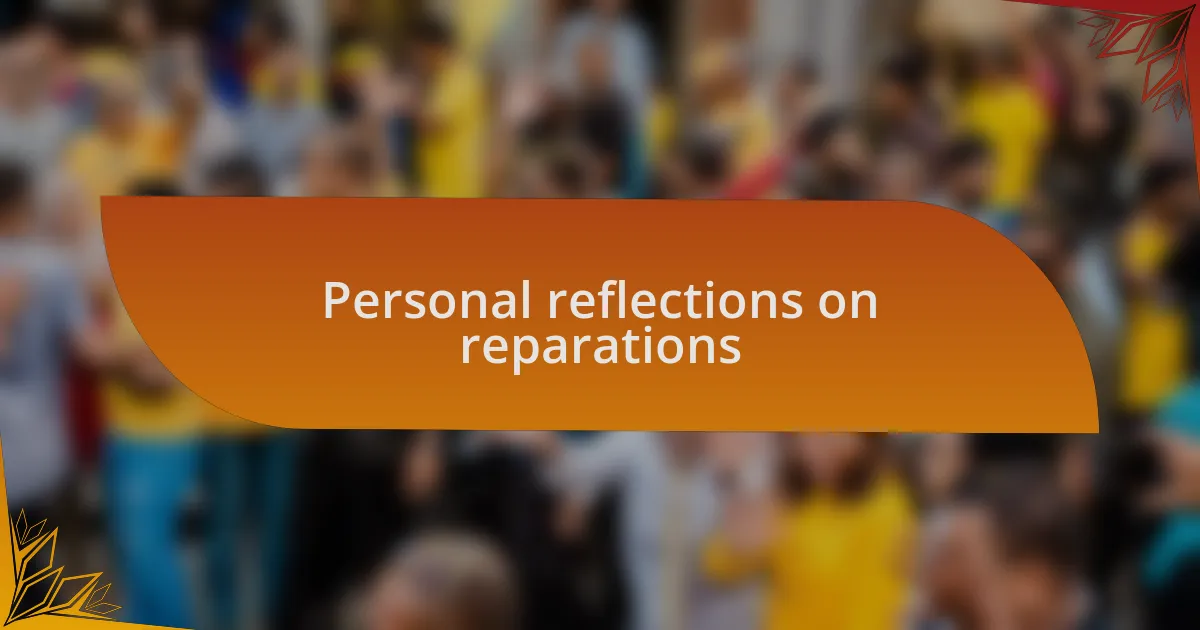
Personal reflections on reparations
Reflecting on reparations, I often find myself grappling with the weight of history. I remember attending a workshop where a leader in the reparations movement shared her family’s stories of loss and resilience. It dawned on me that reparations aren’t merely financial; they represent an emotional acknowledgment of a painful past, a step toward healing both individuals and communities. How can we ignore the stories that shape our society?
In another instance, while volunteering with marginalized communities, I witnessed firsthand the impact of systemic inequality. A young mother shared her struggles to provide for her children, burdened not just by financial instability but by the historical injustices that set her on this path. It made me question: What if reparations could lift these burdens and empower future generations? The idea of reparations as a bridge toward equity became clearer to me that day.
I’ve also started to explore the fears surrounding the topic of reparations. At a local town hall meeting, an elderly man expressed his anxiety about the implications of reparations on community dynamics. His concern made me realize that conversations must extend beyond the financial aspect to include the emotional dialogues that need to happen. Isn’t it vital to address both sides of this narrative to foster understanding and compassion in the community?
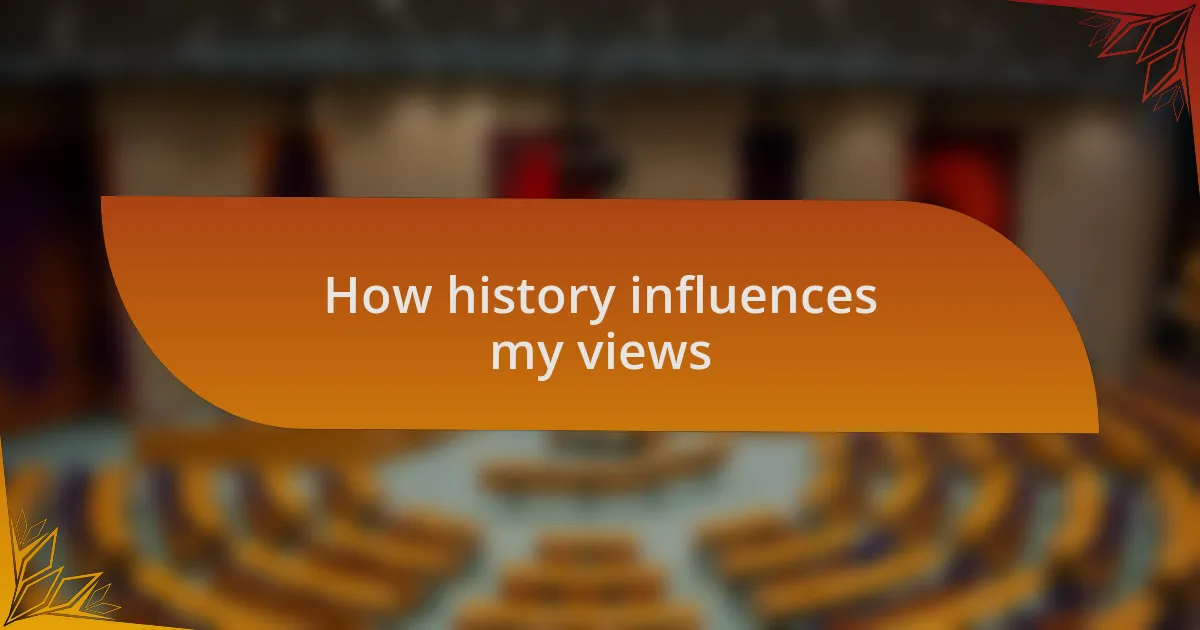
How history influences my views
I often reflect on how historical narratives shape my understanding of reparations. I recall a visit to a local museum where an exhibit detailed the injustices faced by marginalized communities over decades. Standing among those stories, I felt the weight of generations compressed into images and texts, reminding me that reparations are not just about money; they are about restoring dignity and recognizing the humanity that has been systematically undermined.
Thinking back on my conversations with friends who are skeptical about reparations, I realize their views are often deeply influenced by their own historical contexts. One friend, raised in a mixed neighborhood where narratives of hardship were overshadowed by success stories, struggled to see the relevance of reparations. I found myself asking, how can we bridge this gap in understanding? It’s crucial for us to explore history together, to unpack how our different experiences color our perceptions of justice and responsibility.
I vividly remember debating the topic of reparations with classmates in college. Their varied backgrounds led to passionate discussions, where I realized that history truly informs each person’s stance. One classmate spoke of his family’s immigration story, framing their struggles as their own form of injustice. This perspective compelled me to ask: how do we reconcile different histories in our conversation about reparations? It’s clear that our past experiences create a lens through which we view current issues, often complicating our collective understanding of fairness and equity.
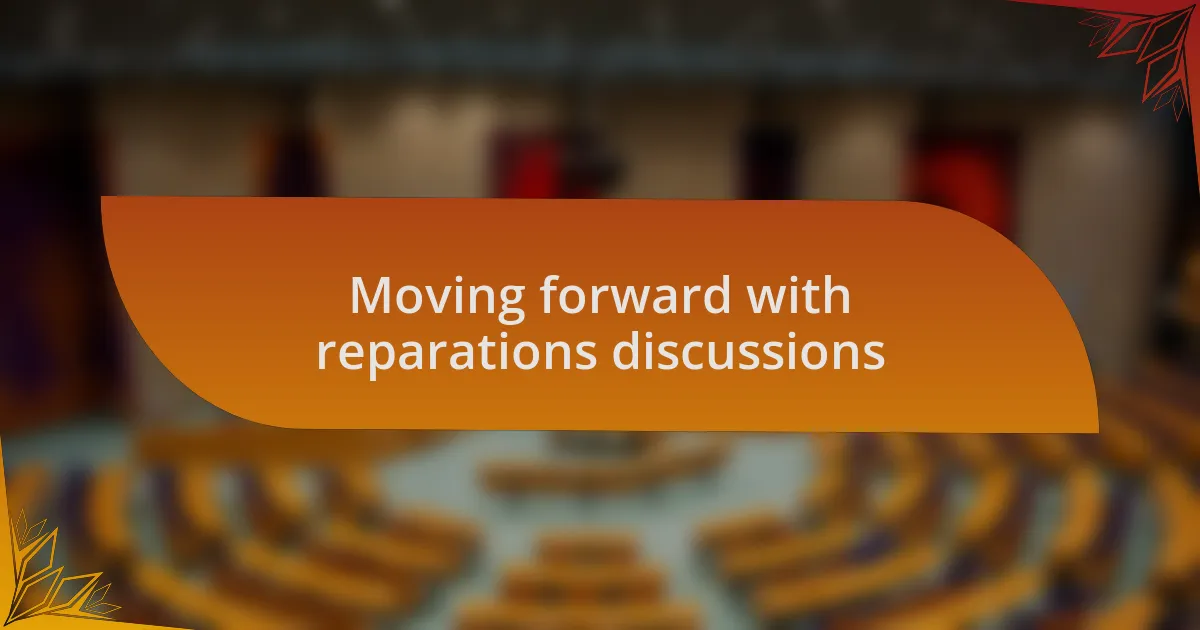
Moving forward with reparations discussions
Moving forward, I believe it’s vital to broaden our discussions about reparations beyond mere compensation. During a recent community forum, I was struck by how participating in a dialogue with people from various backgrounds deepened my understanding of their grievances and hopes. Hearing their stories made me think, isn’t it time we prioritize listening over arguing? Each narrative shared offers a piece of the larger puzzle, enriching the conversation and fostering empathy.
As I engage in discussions about reparations, I often wonder how we can create a safe space for these delicate conversations to thrive. At a local gathering, one participant tearfully recounted their family’s legacy of loss and resilience, a moment that highlighted for me the power of storytelling. It raised the question: if our histories are woven together through similar wounds, could this connection serve as the foundation for a more united front in advocating for change?
I’ve also realized that moving forward requires us to challenge our assumptions collectively. Just last week, a friend and I exchanged thoughts on the potential benefits of reparations, and it struck me—what if we approached this topic with curiosity rather than defensiveness? I felt a shift occur as we explored our misconceptions together, uncovering insights that might lead to a more nuanced understanding of justice. In doing so, we have the opportunity to cultivate a shared vision for reparations that resonates with all voices involved.